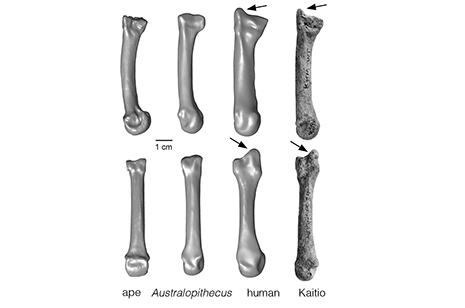Newly Discovered Bone Shows Early Evolution of Human Hand

Comparisons of third metacarpals with the recently discovered bone from Kenya on the right. Copyright Carol V. Ward.
FAYETTEVILLE, Ark. – A recently discovered bone from the hand of an East African hominim provides the earliest record of a structural feature related to tool use. At 1.42 million years old, the bone is evidence of the evolution of a distinctive feature of modern hands more than half a million years earlier than previously known.
“Modern human hands are specialized to hold tools, but hand bones are difficult to find, and we haven’t known when modern human hands developed,” said J. Michael Plavcan, professor of anthropology at the University of Arkansas. “With this discovery, we have the earliest evidence of the structural changes of the hand that are associated with tool use.”
The bone was discovered by Fredrick Kyalo Manthi of the National Museums of Kenya at the Kaitio site in Kenya, and it was analyzed by a team including Plavcan, Carol Ward of the University of Missouri, Matthew Tocheri of the Smithsonian Institution and Francis Brown of University of Utah.
When the team examined the third metacarpal bone, they found that it displayed a styloid process, a curved projection at the end of the bone. The styloid process is important to a hand that uses tools with both dexterity and precision. The styloid process locks in place with the other wrist bones and assists in resisting the forces that result from holding tools and applying pressure.
Stone tools date back at least 2.58 million years, yet until this discovery, the earliest evidence of structural characteristics related to tool use dated back just 800,000 years.
In an article published in the Proceedings of the National Academy of Science, the researchers wrote that the newly discovered bone “suggests that an increased reliance on manipulatory behaviors indicated by the archeological record early in the Pleistocene selected for the modern human hand early in the evolution of the genus Homo.”
“There’s still a huge gap in our understanding of the evolution of the hand,” Plavcan said. “We need to find even earlier bones to determine just when structural features of the hand appeared.”
 The 1.42 million-year-old metacarpal was discovered at the Kaitio site in Kenya. Copyright Carol V. Ward. |
Plavcan is professor of anthropology in the J. William Fulbright College of Arts and Sciences at the University of Arkansas. He is a principal member of the West Turkana Paleontology Project, working with Manthi, the project leader, and Ward. Plavcan’s fieldwork is centered on Kanapoi, the type site of Australopithecus anamensis. The project draws on the expertise of an international team of researchers to understand the fauna and environment of the Kanapoi site, which is crucial to understanding the origins of the australopithecines and, ultimately, humans. Plavcan’s research has been funded by the National Science Foundation, the Wenner-Gren Foundation, the Leakey Foundation, the National Institute for Dental Research, Sigma Xi and several university grants.
Topics
Contacts
J. Michael Plavcan, professor, anthropology
J. William Fulbright College of Arts and Sciences
479-575-2546,
mplavcan@uark.edu
Barbara Jaquish, science and research communications officer
University Relations
479-575-2683,
jaquish@uark.edu
Headlines
PetSmart CEO J.K. Symancyk to Speak at Walton College Commencement
J.K. Symancyk is an alumnus of the Sam M. Walton College of Business and serves on the Dean’s Executive Advisory Board.
Faulkner Center, Arkansas PBS Partner to Screen Documentary 'Gospel'
The Faulkner Performing Arts Center will host a screening of Gospel, a documentary exploring the origin of Black spirituality through sermon and song, in partnership with Arkansas PBS at 7:30 p.m. Thursday, May 2.
UAPD Officers Mills and Edwards Honored With New Roles
Veterans of the U of A Police Department, Matt Mills has been promoted to assistant chief, and Crandall Edwards has been promoted to administrative captain.
Community Design Center's Greenway Urbanism Project Wins LIV Hospitality Design Award
"Greenway Urbanism" is one of six urban strategies proposed under the Framework Plan for Cherokee Village, a project that received funding through an Our Town grant from the National Endowment for the Arts.
Spring Bike Drive Refurbishes Old Bikes for New Students
All donated bikes will be given to Pedal It Forward, a local nonprofit that will refurbish your bike and return it to the U of A campus to be gifted to a student in need. Hundreds of students have already benefited.




